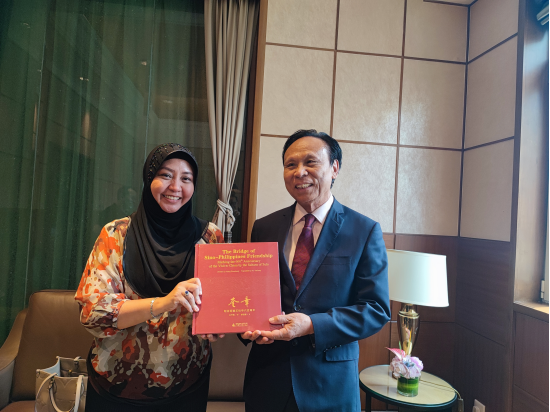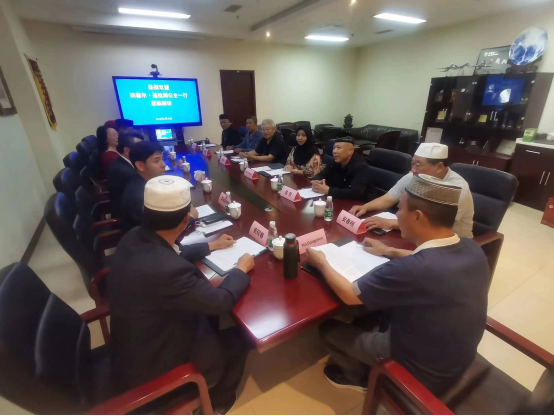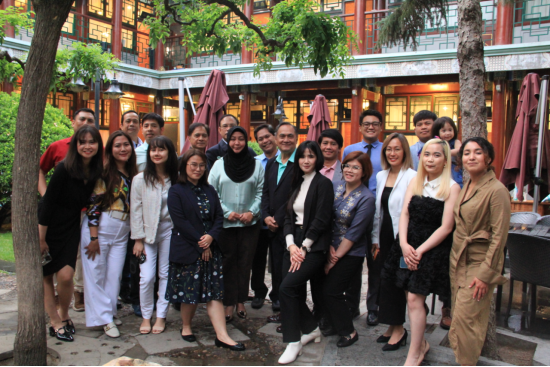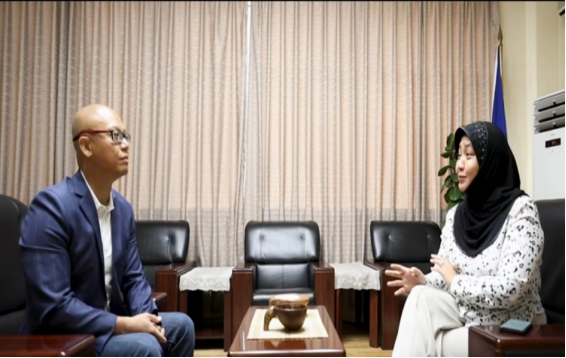Carry Forward Long-lasting Friendship and Promote People-to-people Exchanges—A Record of the Visit of President of International Center for Peace, Reconciliation and Development (ICPRD) Princess Jacel Kiram of the Sultanate of Sulu to China
Published: June 27, 2023 Source: International Cooperation Center
In early summer, Beijing is lush with greenery and brimmed with vitality. In the morning of May 28, at the Beijing International Club, Zhang Chongqing, member of the Strategy Advisory Committee of the ICC and Honorary President of the China Group Companies Association (CGCA) met President of International Center for Peace, Reconciliation and Development (ICPRD) Princess Jacel Kiram of the Sultanate of Sulu on behalf of the ICC.
Zhang Chongqing warmly welcomed Princess Jacel, a descendant of the Sultan of Sulu, to visit China. They reviewed the 606-year history of friendly exchanges between China and the ancient Sultanate of Sulu. Zhang Chongqing expressed his expectation that Princess Jacel would carry forward the time-honored friendship between China and the Philippines, deepen people-to-people exchanges and make greater contributions to regional and global peace and development. Princess Jacel said that over 600 years ago, the convoy of her ancestor—the East King of Sulu reached China after a long and arduous voyage. The King arrived in Fujian and then headed to Beijing for an audience with the Yongle Emperor, the third ruler of the Chinese Ming Dynasty (1368-1644 CE), sowing the seed of the friendly relations between China and Philippine. As a descendant of the royal family of the Sultanate of Sulu, Princess Jacel stands ready to carry forward the tradition established by her ancestors and continue to be the messenger of friendly exchange between the two countries so as to contribute unremitting effort to the friendship between the two peoples for generations to come.

Princess Jacel presents Zhang Chongqing with the commemorative book of the 600th anniversary of the East King of Sulu’s visit to China.
Zhang Chongqing briefed Princess Jacel on the economic recovery and other economic and social progress in China in recent years. He highlighted how major China’s SOEs reached out to play an important role in the construction of, investment in and cooperation on key projects in BRI countries. After the meeting, Princess Jacel presented Zhang Chongqing with the commemorative book entitled “Kui Zhang: The Bridge of Sino-Philippines Friendship—Marking the 600th Anniversary of the Visit to China by the Sultans of Sulu”. Yang Song, General Manager of Overseas Investment and Development Department of CCCC First Highway Engineering Group Co., Ltd., and Wu Zhonglin, Executive Director of Development Committee of the ICC Joint Council attended the meeting.
In the afternoon of May 28, Princess Jacel met with delegates of the Chinese descendants of the East King of Sulu from Dezhou City, Shandong Province and Changying Area, Beijing Municipality in a gathering organized by the ICC and the Committee of Returned Overseas Chinese from Philippine of the Beijing Returned Overseas Chinese Federation. Princess Jacel had a cordial exchange with the delegates, and all parties agreed to jointly organize a series of activities to commemorate the 606th anniversary of the East King of Sulu’s visit to China in several cities in China and the Philippines in the second half of this year. By doing so they hope to inject the momentum of the new era into the long-lasting relations and to promote friendly cooperation between the two countries.

Princess Jacel exchanges with delegates of the descendants.
In the evening of May 28, Princess Jacel went to the Chang’an Grand Theatre to watch a Peking opera called Silang Visits His Mother, experiencing the magnificent traditional Chinese opera culture.
On May 29th, at the invitation of Philippines Ambassador to China Jaime FlorCruz, Princess Jacel visited the Embassy of the Republic of Philippines in China and received an exclusive interview with the Philippines Division of the Asian African Languages Program Center of China Media Group (CMG). During the interview, Princess Jacel shared her thoughts on her visit to China, and hoped that the two countries carry out more multi-dimensional and multi-level people-to-people exchanges and dialogues between civilizations. Thus, as youngsters of both countries can better understand each other’s history and culture, two peoples are more willing to support China-Philippines relations.

Princess Jacel with Philippine Diplomats in China

Princess Jacel receives exclusive interview.
In the light of Princess Jacel’s contribution to the friendship and exchanges between China and the Philippines, Cheng Yu, the Executive Secretary of the ICC, appointed Princess Jacel as the “China-Philippines Friendship Envoy of the ICC” on behalf of the ICC at the Beijing International Club on May 29. The ICC reckons that China and the Philippines should take the establishment of the China-ASEAN Comprehensive Strategic Partnership and enforcement of the Regional Comprehensive Economic Partnership (RCEP) as a crucial opportunity to promote high-level exchanges between China and the Philippines, deepen communication and cooperation in various fields, and contribute to the regional and global peace and development.
On the same day, the head of the Steering Committee of the ICC met with Princess Jacel.
Related Information: Introduction of the East King of Sulu’s Visit to China
The Sultanate of Sulu covered the southern part of today’s Philippines. Since the onset of ancient maritime Silk Road, the ancient Chinese have begun trading with the Sulu people by sea. In 1417, the East King of Sulu, accompanied by his family and officials, led a royal mission of over 340 people and traveled across mountains and seas to Beijing, where he had an audience with the Yongle Emperor of the Ming Dynasty (1403-1424). However, the King Paduka Pahala unfortunately died in Dezhou, Shandong Province, on his way back the Sultanate of Sulu. The Yongle Emperor deeply mourned for his death and sent Chen Shiqi, a Director in the Ministry of Rites, to Dezhou to hold a grand funeral for the Sulu King. The Emperor even wrote a eulogy himself and ordered to erect a monument to commemorate the King, who was bestowed with the posthumous name of Gongding, which meant obedient and moral. In addition to build a grand tomb, the Emperor granted the Queen Consort, the King’s two sons and other 7 entourage to stay in China and guard the King’s tomb. Due to their beliefs, the Emperor ordered three Muslim households namely Xia’s, Ma’s and Chen’s to migrate to Dezhou and take care of the King’s family. Since then, the descendants of the King have settled down in China and flourished. During the Yongzheng period of the Qing Dynasty (1722-1735), the descendants of the Sulu King were formally registered as Chinese with “An” and “Wen” surnames, which were fully integrated into the Chinese civilization. By now, there are over 3700 descendants in China.

